23 O Talks Insights That Will Feed Your Soul
If there's one thing Oprah loves, it's getting to know what makes people tick. All is revealed in some of our favorite moments from O Talks....

Photo: Joe Pugliese
Maya Angelou
May 2013
Oprah: I see so many women around me in their 30s and 40s Botoxing themselves and just fighting the aging process all the way. Were you ever anxious about it?
Maya Angelou: I can't remember ever being anxious about it.... At every age, I've been grateful. I talked to you years ago about how important that is. Get up in the morning. Thank you, Lord. Thank you for this day. Thank you for the light coming through that window. Thank you for my breath. Thank you for the phone call that told me I have the job. Thank you even for the phone call that told me I'm not wanted anymore. Thank you, because I know you have something better for me lined up.
Read the full interview from the May 2013 issue.
Oprah: I see so many women around me in their 30s and 40s Botoxing themselves and just fighting the aging process all the way. Were you ever anxious about it?
Maya Angelou: I can't remember ever being anxious about it.... At every age, I've been grateful. I talked to you years ago about how important that is. Get up in the morning. Thank you, Lord. Thank you for this day. Thank you for the light coming through that window. Thank you for my breath. Thank you for the phone call that told me I have the job. Thank you even for the phone call that told me I'm not wanted anymore. Thank you, because I know you have something better for me lined up.
Read the full interview from the May 2013 issue.
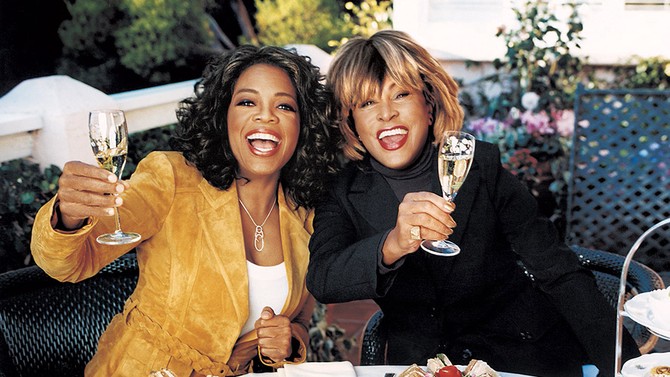
Photo: Kwaku Alston
Tina Turner
May 2005
Oprah: What did the Ike years teach you about yourself?
Tina Turner: That's when I learned that I was truly talented. Before I met Ike, I was singing at church and at picnics—but lots of people sing at church and picnics. After I moved with my mother to St. Louis, my older sister and I went to see Ike Turner, who was the hottest then. His music charged me. I was never attracted to him, but I wanted to sing with his band. Ike thought I couldn't sing because I was a skinny-looking girl. Oprah, you were Ike's type. He liked the ladies with the hips.
OW: Oh, I really missed out on that one! What is Ike's phone number?
Read the full interview from the May 2005 issue.
Oprah: What did the Ike years teach you about yourself?
Tina Turner: That's when I learned that I was truly talented. Before I met Ike, I was singing at church and at picnics—but lots of people sing at church and picnics. After I moved with my mother to St. Louis, my older sister and I went to see Ike Turner, who was the hottest then. His music charged me. I was never attracted to him, but I wanted to sing with his band. Ike thought I couldn't sing because I was a skinny-looking girl. Oprah, you were Ike's type. He liked the ladies with the hips.
OW: Oh, I really missed out on that one! What is Ike's phone number?
Read the full interview from the May 2005 issue.
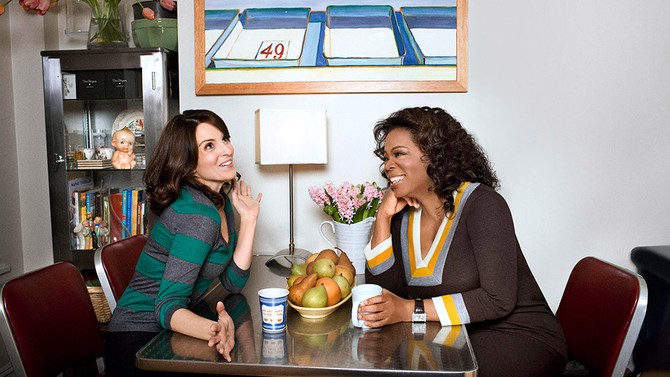
Photo: Rob Howard
Tina Fey
February 2009
Oprah: Do you feel like the big star that everybody says you are?
Tina Fey: Not exactly. One day last week when I was writing, I was in my sweatpants, exhausted, and I realized I'd just eaten six Kit Kats in ten minutes.
OW: Kit Kats are your drug of choice?
TF: Actually, it's usually doughnuts. When I have a day when my hair is dirty and I'm tired, my friend Kay sings this little song she made up [Tina sings]: "TV star, livin' the life, just like Jennifer Aniston!" My life is not at all like Jennifer's.
Read the full interview from the February 2009 issue.
Oprah: Do you feel like the big star that everybody says you are?
Tina Fey: Not exactly. One day last week when I was writing, I was in my sweatpants, exhausted, and I realized I'd just eaten six Kit Kats in ten minutes.
OW: Kit Kats are your drug of choice?
TF: Actually, it's usually doughnuts. When I have a day when my hair is dirty and I'm tired, my friend Kay sings this little song she made up [Tina sings]: "TV star, livin' the life, just like Jennifer Aniston!" My life is not at all like Jennifer's.
Read the full interview from the February 2009 issue.
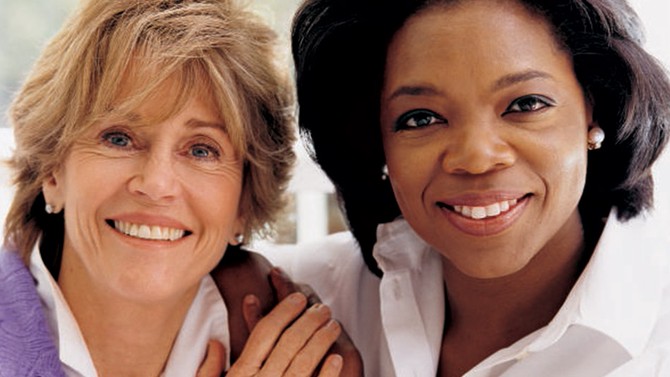
Photo: Richard Phibbs
Jane Fonda
July 2000
Oprah: What do you need to pull together in your third act?
Jane Fonda: Intimacy. That's what I have to work on.
OW: When you say intimacy, you're not talking about sex, right?
JF: Sex and intimacy are not the same: You can have sex all your life and never be intimate with a person. There has to be empathy in the relationship. You have to enjoy seeing through their eyes. When you're with them, you're there and not thinking about what you're gonna do tomorrow.
OW: Doesn't intimacy require a fully opened heart?
JF: You can think that you have a fully opened heart, but as with an onion, there are layers to the heart. You can think it's fully opened and then discover a whole other layer.
Read the full interview from the July 2000 issue.
Oprah: What do you need to pull together in your third act?
Jane Fonda: Intimacy. That's what I have to work on.
OW: When you say intimacy, you're not talking about sex, right?
JF: Sex and intimacy are not the same: You can have sex all your life and never be intimate with a person. There has to be empathy in the relationship. You have to enjoy seeing through their eyes. When you're with them, you're there and not thinking about what you're gonna do tomorrow.
OW: Doesn't intimacy require a fully opened heart?
JF: You can think that you have a fully opened heart, but as with an onion, there are layers to the heart. You can think it's fully opened and then discover a whole other layer.
Read the full interview from the July 2000 issue.
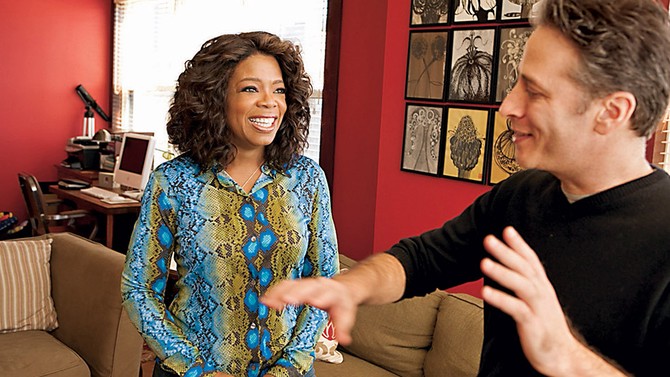
Photo: George Lange
Jon Stewart
June 2005
Oprah: Do you deny that you are powerful?
Jon Stewart: Yes—I deny that I am powerful. Power implies an agenda that's being acted on.
OW: But more than anyone else, you have us thinking about politics differently.
JS: Every generation has had its people who stand at the back and make fun of those in charge. When the Nazis came to power in the '30s, it created an incredible underground scene of satirical comedy. The British comedian Peter Cook once said with a straight face, "Yes, they really showed Hitler." That's how I see it.
Read the full interview from the June 2005 issue.
Oprah: Do you deny that you are powerful?
Jon Stewart: Yes—I deny that I am powerful. Power implies an agenda that's being acted on.
OW: But more than anyone else, you have us thinking about politics differently.
JS: Every generation has had its people who stand at the back and make fun of those in charge. When the Nazis came to power in the '30s, it created an incredible underground scene of satirical comedy. The British comedian Peter Cook once said with a straight face, "Yes, they really showed Hitler." That's how I see it.
Read the full interview from the June 2005 issue.
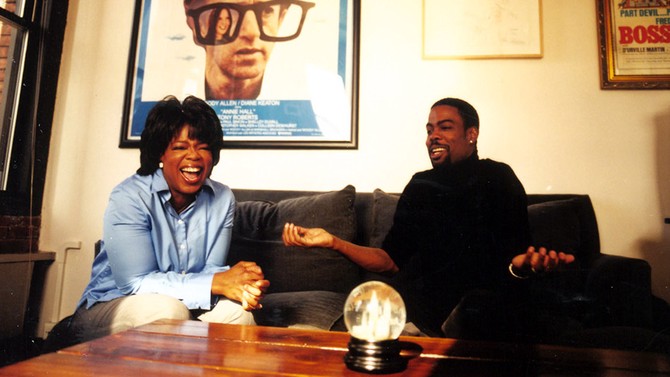
Photo: Rob Howard
Chris Rock
June 2002
Oprah: You're more than just funny—you take difficult subjects and make them entertaining. What gives you the chutzpah to delve into the hard stuff?
Chris Rock: I don't know! I was raised on rap music—the first art form created by black people who were free to say anything they wanted. So the rap on those first N.W.A. and Public Enemy records—the good rap, not the garbage—already contained much of what I've said.
OW: One of your funniest routines is about a black woman trying to use a maxed-out credit card that she prays won't be rejected at the department store.
CR: Every time I see you, you request that story like it's a song or something. You're like, "Hey, Chris, can you do the one about the black woman in the department store?"
OW: That's because I have been that woman.
Read the full interview from the June 2002 issue.
Oprah: You're more than just funny—you take difficult subjects and make them entertaining. What gives you the chutzpah to delve into the hard stuff?
Chris Rock: I don't know! I was raised on rap music—the first art form created by black people who were free to say anything they wanted. So the rap on those first N.W.A. and Public Enemy records—the good rap, not the garbage—already contained much of what I've said.
OW: One of your funniest routines is about a black woman trying to use a maxed-out credit card that she prays won't be rejected at the department store.
CR: Every time I see you, you request that story like it's a song or something. You're like, "Hey, Chris, can you do the one about the black woman in the department store?"
OW: That's because I have been that woman.
Read the full interview from the June 2002 issue.
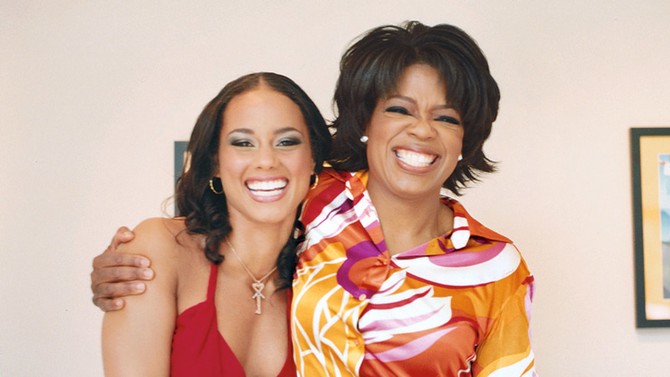
Photo: Rob Howard
Alicia Keys
September 2004
Oprah: Did you see The Vagina Monologues? There's a great passage about what your vagina is wearing. I came away thinking, "Mine is wearing red patent leather boots. What is yours wearing?"
Alicia Keys: A hat and gloves.
OW: I thought you'd say a hat and a cane.
AK: I like that better!
Read the full interview from the September 2004 issue.
Oprah: Did you see The Vagina Monologues? There's a great passage about what your vagina is wearing. I came away thinking, "Mine is wearing red patent leather boots. What is yours wearing?"
Alicia Keys: A hat and gloves.
OW: I thought you'd say a hat and a cane.
AK: I like that better!
Read the full interview from the September 2004 issue.
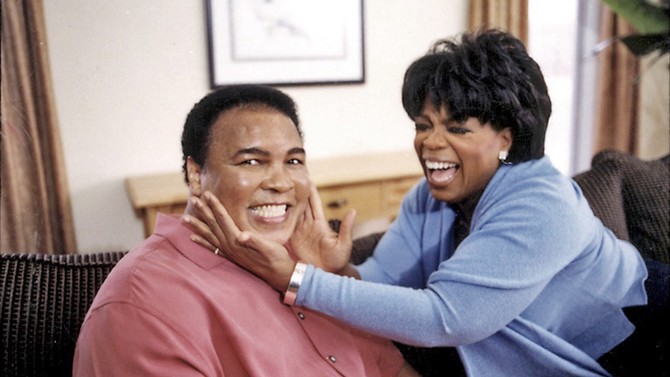
Photo: Kwaku Alston
Muhammad Ali
June 2001
Oprah: Your brother said that when you came home after winning the Olympic gold in 1960, you were refused service at a restaurant in Louisville.
Muhammad Ali: I walked in and tried to order two hamburgers, and I was told, "We don't serve Negroes." I said, "Good—because I don't eat them either."
Read the full interview from the June 2001 issue.
Oprah: Your brother said that when you came home after winning the Olympic gold in 1960, you were refused service at a restaurant in Louisville.
Muhammad Ali: I walked in and tried to order two hamburgers, and I was told, "We don't serve Negroes." I said, "Good—because I don't eat them either."
Read the full interview from the June 2001 issue.
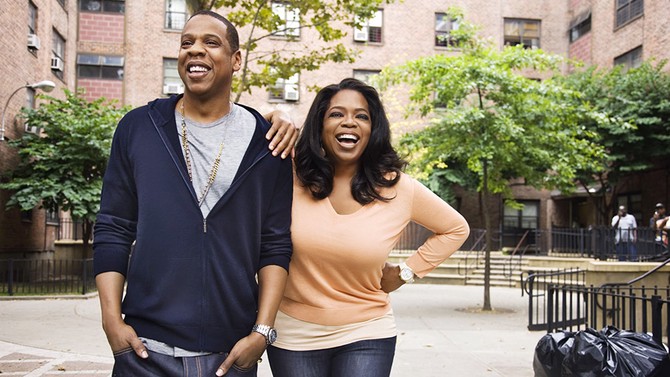
Photo: Rob Howard
Jay Z
October 2009
Oprah: How did you decide to leave the streets for good?
Jay Z: I started seeing people go to jail and get killed, and the light slowly came on. I was like, "This life has no good ending."
OW: That is so fascinating to me. Because what crack did to the community—drug dealers were a part of that. When you were dealing, did you not see yourself as a part of the problem?
J: Later. Looking back. Not while I was in it. I didn't know the effect it was having.... We used to say all the time, "Man, her life is all messed up—she used to be so cute. She was fine six months ago. Look at her, she's finished." But you never thought you contributed to that.
Read the full interview from the October 2009 issue.
Oprah: How did you decide to leave the streets for good?
Jay Z: I started seeing people go to jail and get killed, and the light slowly came on. I was like, "This life has no good ending."
OW: That is so fascinating to me. Because what crack did to the community—drug dealers were a part of that. When you were dealing, did you not see yourself as a part of the problem?
J: Later. Looking back. Not while I was in it. I didn't know the effect it was having.... We used to say all the time, "Man, her life is all messed up—she used to be so cute. She was fine six months ago. Look at her, she's finished." But you never thought you contributed to that.
Read the full interview from the October 2009 issue.
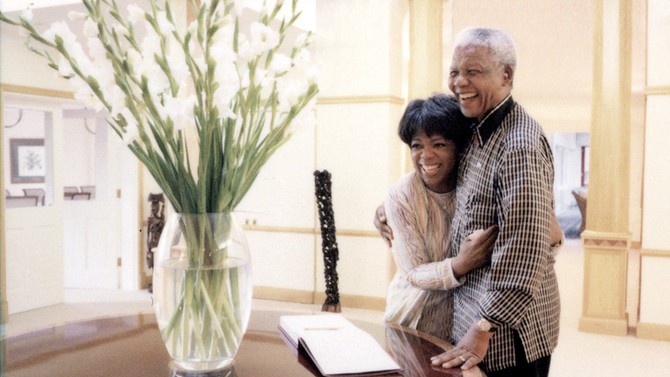
Photo: Louise Gubb
Nelson Mandela
April 2001
Oprah: You became even more disciplined in prison than you had been before, studying regularly and encouraging your colleagues to study. Why?
Nelson Mandela: I knew we could improve our lives even in jail. We could come out as different men, and we could even come out with two degrees. Educating ourselves was a way to give ourselves the most powerful weapon for freedom.
OW: Did you come out a wiser man?
NM: All I can say is that I was less foolish than I was when I went in. I equipped myself by reading literature, especially classic novels such as The Grapes of Wrath.
OW: That's one of my favorite books.
NM: When I closed that book, I was a different man. It enriched my powers of thinking and discipline, and my relationships. I left prison more informed than when I went in. And the more informed you are, the less arrogant and aggressive you are.
Read the full interview from the April 2001 issue.
Oprah: You became even more disciplined in prison than you had been before, studying regularly and encouraging your colleagues to study. Why?
Nelson Mandela: I knew we could improve our lives even in jail. We could come out as different men, and we could even come out with two degrees. Educating ourselves was a way to give ourselves the most powerful weapon for freedom.
OW: Did you come out a wiser man?
NM: All I can say is that I was less foolish than I was when I went in. I equipped myself by reading literature, especially classic novels such as The Grapes of Wrath.
OW: That's one of my favorite books.
NM: When I closed that book, I was a different man. It enriched my powers of thinking and discipline, and my relationships. I left prison more informed than when I went in. And the more informed you are, the less arrogant and aggressive you are.
Read the full interview from the April 2001 issue.
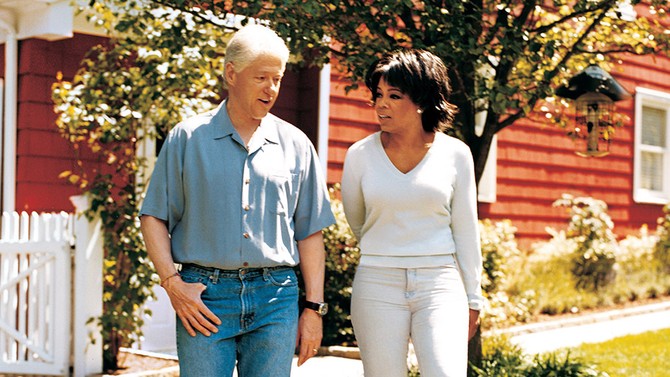
Photo: Rob Howard
Bill Clinton
August 2004
Oprah: Have you become the man you've endeavored to be?
Bill Clinton: No. That's a lifetime journey. Every day mirrors the act of creation. Each morning you have to get up and create all over again. The building is never done. If I'm lucky enough to live to be 80, and you come back and ask me that question again, I'd still say no.
Read the full interview from the August 2004 issue.
Oprah: Have you become the man you've endeavored to be?
Bill Clinton: No. That's a lifetime journey. Every day mirrors the act of creation. Each morning you have to get up and create all over again. The building is never done. If I'm lucky enough to live to be 80, and you come back and ask me that question again, I'd still say no.
Read the full interview from the August 2004 issue.
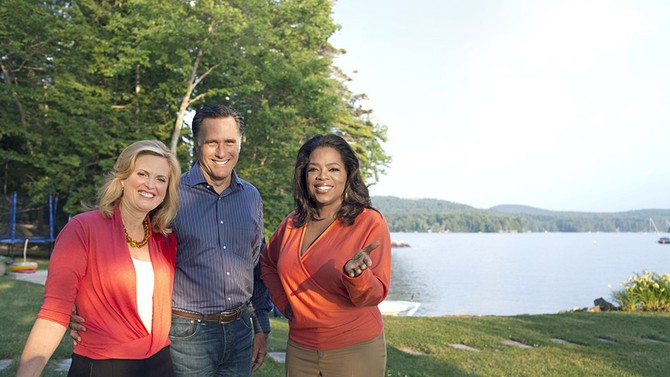
Photo: Rob Howard
Mitt Romney
November 2012
Oprah: When you were asked a while back what grade you would give President Obama, I recall you said you'd give him an F.
Mitt Romney: Absolutely.
OW: Did you ever get an F in anything?
MR: I got an F on a paper once. Political science, actually.
Read the full interview from the November 2012 issue.
Oprah: When you were asked a while back what grade you would give President Obama, I recall you said you'd give him an F.
Mitt Romney: Absolutely.
OW: Did you ever get an F in anything?
MR: I got an F on a paper once. Political science, actually.
Read the full interview from the November 2012 issue.

Photo: George Burns
Ellen DeGeneres
December 2009
Oprah: Would you say that coming out was the seminal moment in your life?
Ellen DeGeneres: Oh yeah, because it stripped everything away. The whole world was talking about me. You know, if you're going to be honest with yourself, you have to admit that you go into show business wanting people to talk about you and wanting everyone to know who you are. But that also means there are going to be a whole bunch of people who don't like you. No matter who you are. I'm sure there's somebody out there who doesn't like Betty White because she's short and has white hair.
Read the full interview from the December 2009 issue.
Oprah: Would you say that coming out was the seminal moment in your life?
Ellen DeGeneres: Oh yeah, because it stripped everything away. The whole world was talking about me. You know, if you're going to be honest with yourself, you have to admit that you go into show business wanting people to talk about you and wanting everyone to know who you are. But that also means there are going to be a whole bunch of people who don't like you. No matter who you are. I'm sure there's somebody out there who doesn't like Betty White because she's short and has white hair.
Read the full interview from the December 2009 issue.
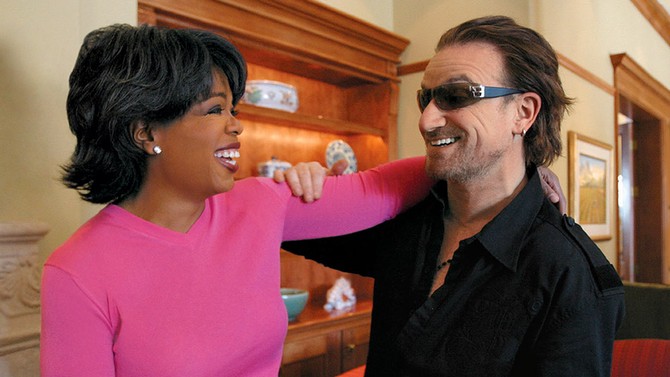
Photo: Benny Gool
Bono
April 2004
Oprah: Do you have anxiety every time you release an album?
Bono: Yes.
OW: You do?
B: Of course. It's much easier to be successful than it is to be relevant.... Tricks might keep you popular for a while, but in all honesty, I don't know how U2 will stay relevant. I know we've got a future. I know we can fill stadiums. And yet with every record, I think, "Is this it? Are we still relevant?"
OW: Well, you haven't been invited to play a Bat Mitzvah yet.
Read the full interview from the April 2004 issue.
Oprah: Do you have anxiety every time you release an album?
Bono: Yes.
OW: You do?
B: Of course. It's much easier to be successful than it is to be relevant.... Tricks might keep you popular for a while, but in all honesty, I don't know how U2 will stay relevant. I know we've got a future. I know we can fill stadiums. And yet with every record, I think, "Is this it? Are we still relevant?"
OW: Well, you haven't been invited to play a Bat Mitzvah yet.
Read the full interview from the April 2004 issue.

Photo: Kwaku Alston
Sidney Poitier
October 2000
Oprah: I read that shortly after you were born, you weren't expected to live because you were delivered so prematurely.
Sidney Poitier: I was expected to be dead within two, three days. I was born two months early, and everyone had given up on me. But my mother insisted on my life. She went throughout the black sections of Miami, where I was born, looking for help to save her child. She went to the church, and she went to the few people she knew. Absolutely heavyhearted, my mom passed a fortune-teller's stall, and she sat with this lady. She said, "I need you to tell me about my son." And the woman said, "Don't worry about your son. He will not be a sickly child. He will walk with kings."
Read the full interview from the October 2000 issue.
Oprah: I read that shortly after you were born, you weren't expected to live because you were delivered so prematurely.
Sidney Poitier: I was expected to be dead within two, three days. I was born two months early, and everyone had given up on me. But my mother insisted on my life. She went throughout the black sections of Miami, where I was born, looking for help to save her child. She went to the church, and she went to the few people she knew. Absolutely heavyhearted, my mom passed a fortune-teller's stall, and she sat with this lady. She said, "I need you to tell me about my son." And the woman said, "Don't worry about your son. He will not be a sickly child. He will walk with kings."
Read the full interview from the October 2000 issue.
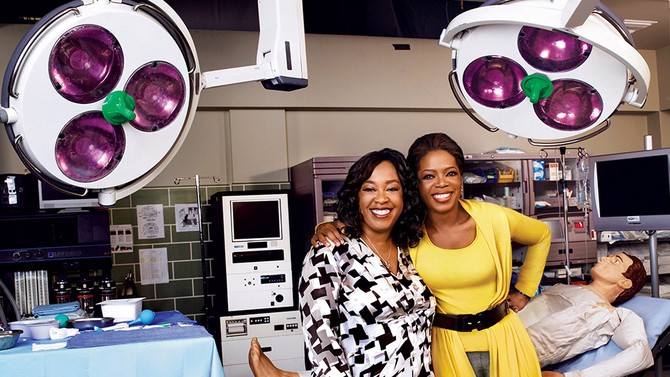
Photo: Kwaku Alston
Shonda Rhimes
December 2006
Oprah: When you created McDreamy on Grey's Anatomy, who did you imagine him to be?
Shonda Rhimes: In some ways, he's a man who doesn't exist. In the first eight episodes, he seems like a perfect guy who's into Meredith—and the audience falls in love with him. But then it is revealed that he has a huge flaw: He has a wife. Isn't that the way it often happens in life? You get hooked before you discover the truth?
Read the full interview from the December 2006 issue.
Oprah: When you created McDreamy on Grey's Anatomy, who did you imagine him to be?
Shonda Rhimes: In some ways, he's a man who doesn't exist. In the first eight episodes, he seems like a perfect guy who's into Meredith—and the audience falls in love with him. But then it is revealed that he has a huge flaw: He has a wife. Isn't that the way it often happens in life? You get hooked before you discover the truth?
Read the full interview from the December 2006 issue.

Photo: Bruce Weber
Michelle Obama
April 2009
Oprah: Gayle once interviewed you for her radio show and was blown away by something you said: that your husband has never disappointed you. Gayle was like, "I can't believe that!"
Michelle Obama: Barack is a human being with flaws. And I can rattle down all the flaws and tease him about them every day, but those flaws are not fundamental. They don't hit upon things that are intolerable to me. In terms of his core values, he has never disappointed me.
Read the full interview from the April 2009 issue.
Oprah: Gayle once interviewed you for her radio show and was blown away by something you said: that your husband has never disappointed you. Gayle was like, "I can't believe that!"
Michelle Obama: Barack is a human being with flaws. And I can rattle down all the flaws and tease him about them every day, but those flaws are not fundamental. They don't hit upon things that are intolerable to me. In terms of his core values, he has never disappointed me.
Read the full interview from the April 2009 issue.
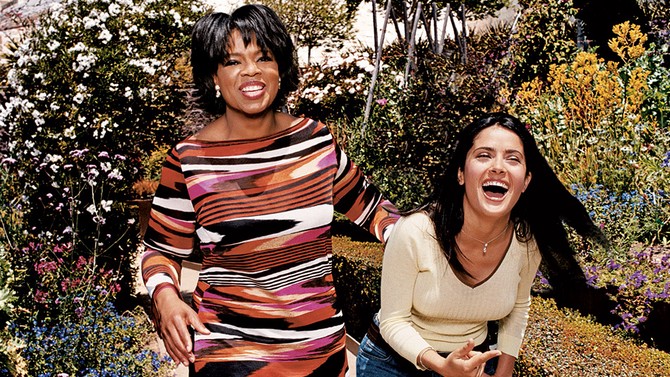
Photo: Kwaku Alston
Salma Hayek
September 2003
Salma Hayek: You simply have to be who you are.
Oprah: Isn't that easy for you to say when you're beautiful?
SH: Yes, I'm beautiful—
OW: I love it that you own that! Over the years, I've talked to beautiful women who say, "Oh, you should see my thighs!"
SH: Well, I do have thighs and a butt. I have cellulite. I fight with it every day. I don't exercise, I eat pork and I love my red wine. But, yes, I am beautiful and famous—and yet the things I like about myself have nothing to do with that....
Read the full interview from the September 2003 issue.
Salma Hayek: You simply have to be who you are.
Oprah: Isn't that easy for you to say when you're beautiful?
SH: Yes, I'm beautiful—
OW: I love it that you own that! Over the years, I've talked to beautiful women who say, "Oh, you should see my thighs!"
SH: Well, I do have thighs and a butt. I have cellulite. I fight with it every day. I don't exercise, I eat pork and I love my red wine. But, yes, I am beautiful and famous—and yet the things I like about myself have nothing to do with that....
Read the full interview from the September 2003 issue.
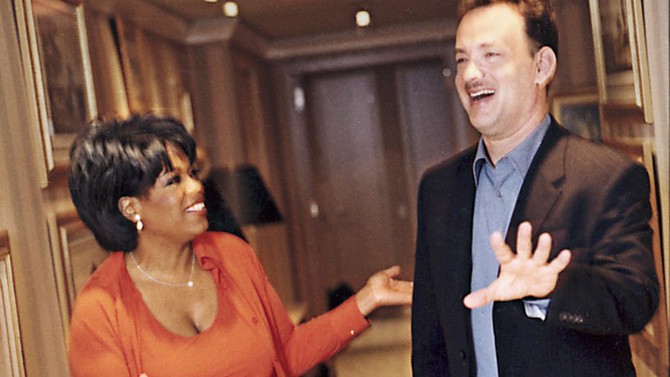
Photo: Art Streiber
Tom Hanks
September 2001
Oprah: A lot of your movies seem to have a moral center. Do you look for those kinds of films?
Tom Hanks: The reason most of us go to the movies is to be involved in someone else's moral dilemma. Whether that dilemma is communicated the way Scorsese did it in Taxi Driver, which is one of the most amazing films I've ever seen, or the way Kirk Douglas did it in Spartacus, you know there's something happening on the screen that is bigger than the lives we lead but that is still recognizable to a 14-year-old in Oakland. I'm not looking for that when I read a script, but I am knocked out by it when I see it.
OW: When you choose a role, is there a soul connection between you and the character?
TH: Yes, that has to be there. If I have no connection with the character, then it's all fake....
Read the full interview from the September 2001 issue.
Oprah: A lot of your movies seem to have a moral center. Do you look for those kinds of films?
Tom Hanks: The reason most of us go to the movies is to be involved in someone else's moral dilemma. Whether that dilemma is communicated the way Scorsese did it in Taxi Driver, which is one of the most amazing films I've ever seen, or the way Kirk Douglas did it in Spartacus, you know there's something happening on the screen that is bigger than the lives we lead but that is still recognizable to a 14-year-old in Oakland. I'm not looking for that when I read a script, but I am knocked out by it when I see it.
OW: When you choose a role, is there a soul connection between you and the character?
TH: Yes, that has to be there. If I have no connection with the character, then it's all fake....
Read the full interview from the September 2001 issue.
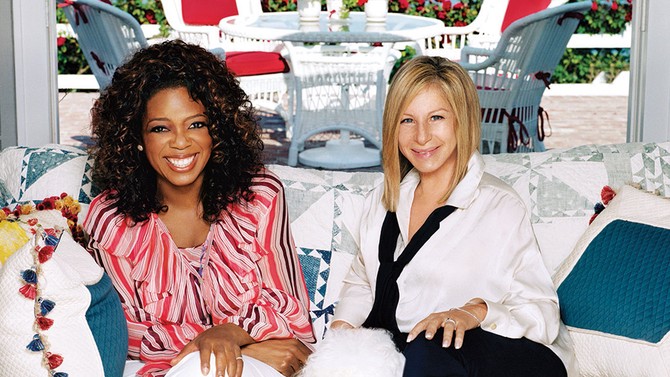
Photo: Firooz Zahedi
Barbra Streisand
October 2006
Oprah: If you hadn't been afraid, would you have changed your nose?
Barbra Streisand: From certain angles, I liked my nose—still do. Some people would tell me, "You could take the bump off." And I would say, "But I like the bump."
OW: Would you consider other kinds of plastic surgery?
BS: Yes, but it's scary. I don't even have pierced ears.
OW: I just pierced mine recently. It was major. And now one has closed up. Yesterday I had to stick a needle through to open it.
BS: Each ear is a different length, so how could you possibly put a hole in exactly the same place on different ears?
OW: You do know you're a perfectionist, right?
Read the full interview from the October 2006 issue.
Oprah: If you hadn't been afraid, would you have changed your nose?
Barbra Streisand: From certain angles, I liked my nose—still do. Some people would tell me, "You could take the bump off." And I would say, "But I like the bump."
OW: Would you consider other kinds of plastic surgery?
BS: Yes, but it's scary. I don't even have pierced ears.
OW: I just pierced mine recently. It was major. And now one has closed up. Yesterday I had to stick a needle through to open it.
BS: Each ear is a different length, so how could you possibly put a hole in exactly the same place on different ears?
OW: You do know you're a perfectionist, right?
Read the full interview from the October 2006 issue.
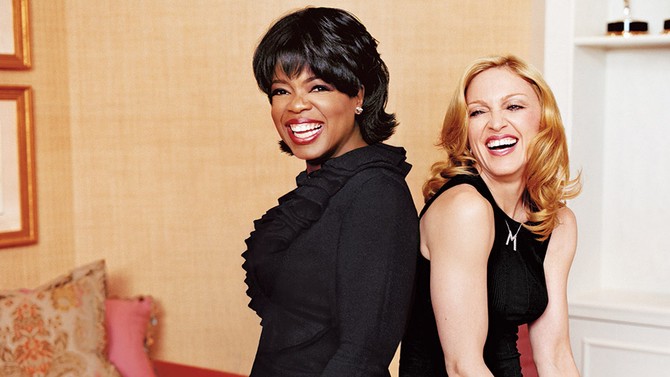
Photo: Kwaku Alston
Madonna
January 2004
Oprah: When you take away the Madonna packaging and marketing, who are you at your core?
Madonna: I'm just a scruffy, tough girl from Michigan who really loves learning and is curious about life—hair back in a ponytail.
OW: But you are the Material Girl.
M: That was meant to be ironic.... There were many years when I thought fame, fortune, and public approval would bring me happiness. But one day you wake up and realize they don't.
Read the full interview from the January 2004 issue.
Oprah: When you take away the Madonna packaging and marketing, who are you at your core?
Madonna: I'm just a scruffy, tough girl from Michigan who really loves learning and is curious about life—hair back in a ponytail.
OW: But you are the Material Girl.
M: That was meant to be ironic.... There were many years when I thought fame, fortune, and public approval would bring me happiness. But one day you wake up and realize they don't.
Read the full interview from the January 2004 issue.
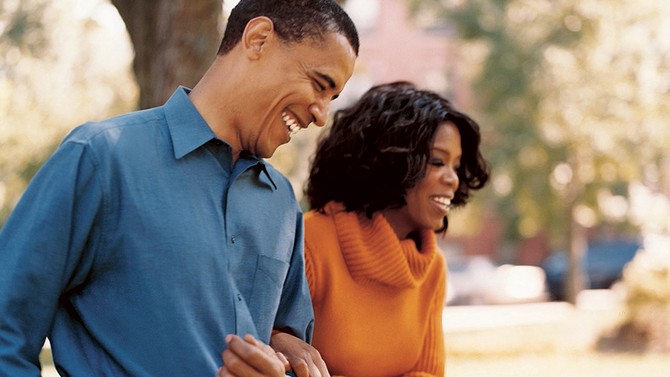
Photo: Marc Royce
Barack Obama
November 2004
Oprah: When I was working at a news station in Baltimore, the manager wanted me to change my name to Suzie. He said, "Nobody will ever remember Oprah."
Barack Obama: I was told, "People will remember your name and won't like it." You can have one African name, but not two. You can be Barack Smith or Joe Obama—but not Barack Obama.
OW: I loved reading where you said, "People don't know whether it's Osama or Yo' Mama."
BO: Alabama, Bahama or Barama.
OW: I think the name is working for you now.
BO: Absolutely. Yours turned out okay for you, too.
Read the full interview from the November 2004 issue.
Oprah: When I was working at a news station in Baltimore, the manager wanted me to change my name to Suzie. He said, "Nobody will ever remember Oprah."
Barack Obama: I was told, "People will remember your name and won't like it." You can have one African name, but not two. You can be Barack Smith or Joe Obama—but not Barack Obama.
OW: I loved reading where you said, "People don't know whether it's Osama or Yo' Mama."
BO: Alabama, Bahama or Barama.
OW: I think the name is working for you now.
BO: Absolutely. Yours turned out okay for you, too.
Read the full interview from the November 2004 issue.
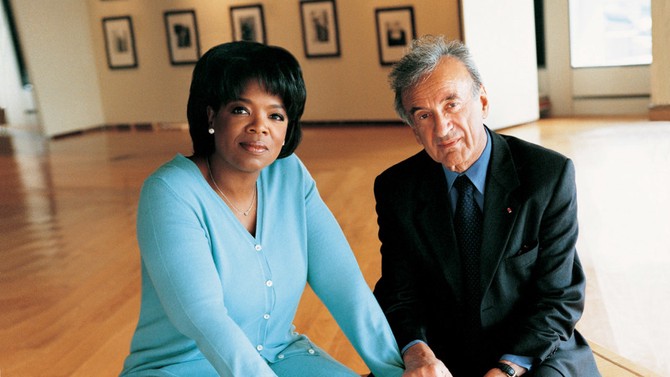
Photo: Brooke Slezak
Elie Wiesel
November 2000
Elie Wiesel: When a person doesn't have gratitude, something is missing in his or her humanity. A person can almost be defined by his or her attitude toward gratitude.
OW: Does having seen the worst of humanity make you more grateful for ordinary occurrences?
EW: For me, every hour is grace. And I feel gratitude in my heart each time I can meet someone and look at his or her smile.
OW: Did you ever hate your oppressors?
EW: I had anger but never hate.
OW: So you don't hate the Germans?
EW: I do not hate them. I don't believe in collective guilt. The children of killers are not killers, but children. And they deserve my affection, my efforts to make them human, to give them a world that is worthy of them.
Read the full interview from the November 2000 issue.
Elie Wiesel: When a person doesn't have gratitude, something is missing in his or her humanity. A person can almost be defined by his or her attitude toward gratitude.
OW: Does having seen the worst of humanity make you more grateful for ordinary occurrences?
EW: For me, every hour is grace. And I feel gratitude in my heart each time I can meet someone and look at his or her smile.
OW: Did you ever hate your oppressors?
EW: I had anger but never hate.
OW: So you don't hate the Germans?
EW: I do not hate them. I don't believe in collective guilt. The children of killers are not killers, but children. And they deserve my affection, my efforts to make them human, to give them a world that is worthy of them.
Read the full interview from the November 2000 issue.
From the May 2015 issue of O, The Oprah Magazine

